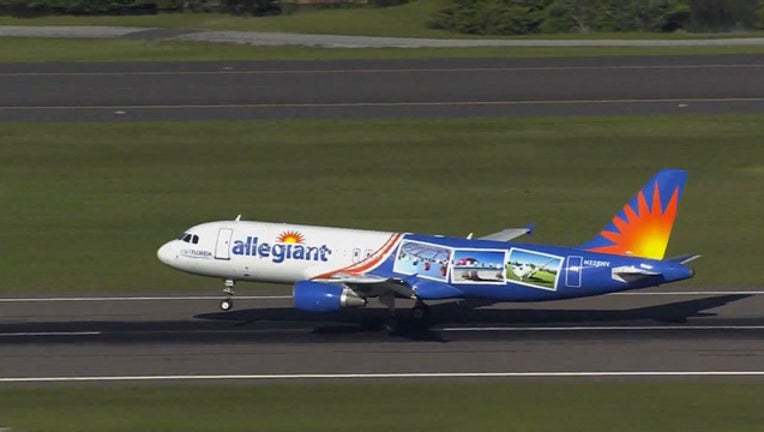Sen. Bill Nelson pushes for investigation into FAA's handling of Allegiant Air

TAMPA, Fla. (AP) - One senator is calling for an investigation into FAA's enforcement of Allegiant Air following a critical "60 Minutes" report.
Senator Bill Nelson sent a letter to the U.S. Department of Transportation on Monday following CBS's report on Allegiant. The airline experienced more than 100 serious mechanical incidents on flights between January 2016 and October 2017. Its record of breakdowns appears related partly to the age of its fleet, particularly its MD-80 planes, which are nearly 28 years old on average and require more maintenance than newer planes.
"Unfortunately, this is not the first report of serious safety concerns with Allegiant's operations," Nelson wrote in reference to the Tampa Bay Times and the Washington Post's 2016 reporting on the matter.
He writes the report suggests that combining Allegiant's business model, older aircraft and "poor safety culture" with FAA's enforcement policy change, it implies that "Allegiant has not been subject to proper scrutiny or penalty."
"The traveling public deserves to know whether the FAA is conducting thorough safety oversight of Allegiant," Nelson said in his letter. "Anything less could lead to disastrous consequences."
The airline plans to retire all its MD-80s by the end of this year. In the meantime, they will continue to fly passengers from smaller airports to resort locations such as Las Vegas and Orlando, Florida.
CBS said that Federal Aviation Administration records it got by filing a Freedom of Information Act request indicate that Allegiant flights were three-and-a-half times more likely to suffer an in-flight breakdown than flights operated by American, United, Delta, JetBlue or Spirit. The report also aired a long-running accusation by the Teamsters union local representing Allegiant pilots that the airline discourages pilots from reporting mechanical problems with planes. It also took aim at the FAA for failing to take action against Allegiant.
Allegiant issued a statement by Eric Gust, vice president of operations, charging that the CBS story told a "false narrative" about Allegiant and the FAA. He said the airline complies with all FAA requirements, and that any suggestion the airline muzzled employees "is offensive and defamatory."
In a memo to employees, CEO Maurice Gallagher and other executives said they were ready "to fight back" against the network. They said the story was based on outdated statistics and was prompted by a pilot who was fired after ordering an emergency evacuation in which some passengers were injured. The pilot is now suing the airline, and one of his paid experts was featured prominently in the "60 Minutes" broadcast.
Price, the former Delta chief pilot, said firing a pilot for ordering an evacuation would be "so far beyond the bound as to constitute safety malfeasance." He said the message to other Allegiant pilots was "that you better not 'waste' company resources in a conflict with safety," which he said seemed to indicate that the airline was putting economics over safety.
Todd Curtis, an aviation-safety consultant, said he tells relatives to avoid the airline. The last time he did that for a U.S. airline of similar size "was ValuJet prior to the 1996 crash in the Everglades," he said. Gallagher was a founder, director and executive at ValuJet.
Investors fear that negative publicity will drive travelers away from Allegiant. Shares of parent company Allegiant Travel Co. fell $4.65, or 3.1 percent, to $146.40 on Monday after dropping 8.6 percent Friday in anticipation of a damaging news report.
"True or false, that was 30 minutes of horrible publicity for Allegiant," Joseph DeNardi, an airline analyst for Stifel, said of the "60 Minutes" broadcast. "We'd be surprised if there isn't an impact to bookings in the nearish term."
Allegiant may have some cause to believe it can weather the storm, however. Most consumers compare prices when shopping for an airline ticket, and Allegiant has some of the cheapest fares around. It also has limited competition on many of its routes.
Allegiant buys used planes to keep costs down. As of Feb. 2, it operated 37 McDonnell-Douglas MD-80 planes and 53 Airbus A319 and A320 jets. The average age of its fleet was 18.5 years, but when the MD-80s are retired it will be in line with other U.S. airline fleets, which range from 5.1 years at Spirit Airlines to 16.7 years at Delta.
Older planes can be operated very safely, but they tend to burn more fuel and require more maintenance.
The attention on Allegiant has also renewed questions about the FAA's performance.
The FAA increased its monitoring of Allegiant in 2016 because of labor tension with its pilots. In 2016, the agency moved up a routine review of the airline by two years after a series of aborted takeoffs and other safety incidents. FAA officials took no enforcement action against Allegiant and said they were satisfied that the airline was addressing problems found by inspectors.
FAA associate administrator of safety Ali Bahrami defended the agency's performance by pointing to the lack of a fatal crash involving a U.S. airline since 2009, and said FAA regulation "has been very successful" in pushing airlines "to the highest level of safety."

